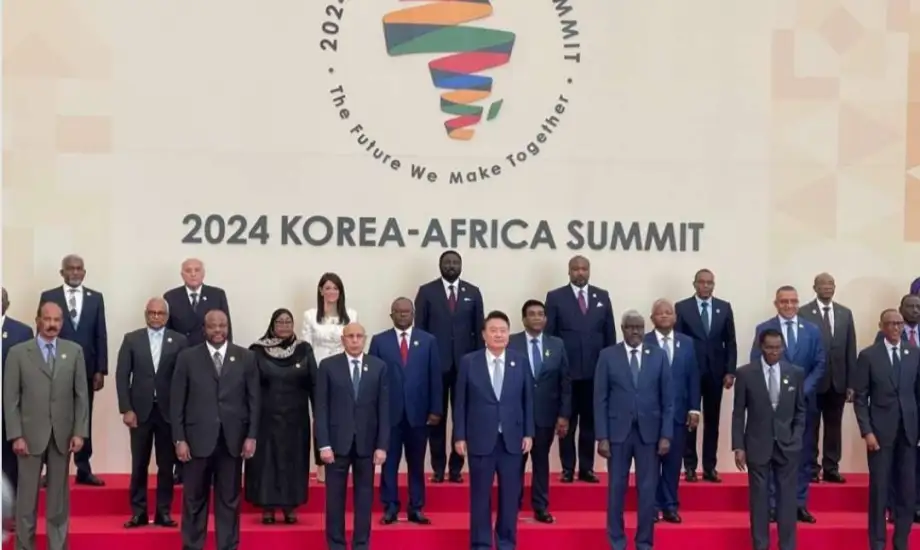Yesterday, the 1st Korea-Africa summit was held in the capital of South Korea, with approximately 48 African leaders in attendance. This event marked a new era in South Korea‘s relationship with African nations.
This can be characterized as a new international actor who is attempting to establish a presence on the continent by capitalizing on the substantial opportunities that cooperation with its countries offers.
South Korea signed approximately 50 preliminary agreements with African countries on the margins of the summit. These agreements are intended to improve cooperation in a variety of industrial and economic sectors, including trade, energy, and critical minerals.
Yoon Suk-yeol, the President of South Korea, has declared that his nation will intensify its collaboration with African nations to guarantee consistent supplies of essential minerals and to facilitate negotiations to encourage economic partnerships and trade.
Yesterday, during the inaugural session of the inaugural summit with leaders from 48 African nations in Seoul, Yoon announced that South Korea will increase its development aid to Africa to $10 billion over the next six years in order to capitalize on the continent’s substantial mineral resources and its potential as a vast export market.
He committed to providing $14 billion in export financing to stimulate trade and investment in African countries for South Korean companies.
The Korean interest in reviving economic relations with the continent prompts inquiries regarding the rationale behind Korea’s emphasis on Africa. Is Seoul seeking to establish a presence, or is it a novel form of competition with China?
●The Global Race to Africa
Dr. Mohamed Sherif Jako, a Chadian expert on African affairs, stated to “Afro News 24” that he comprehends the rationale behind South Korea’s interest in the African continent in the context of the international competition to acquire its natural and unprocessed resources. He cited a number of international African summits, such as the US-Africa Summit, the Russia-Africa Summit, the China-Africa Summit, the France-Africa Summit, the UK-Africa Summit, and the Japan-Africa Summit, in this context.
Dr. Jako underscored that the entire world is currently in pursuit of natural materials and fundamental resources from the African continent, particularly due to the continent’s abundance of mineral wealth, which is essential for numerous critical industries.
He emphasized that the majority of African countries are non-industrial, which means that they do not derive significant benefits from the exploitation of their natural resources. These resources are exported abroad in their basic, unadulterated status.
The expert on African affairs from Chad stated, “I believe that South Korea, as one of the major industrial countries in the world, is entering an economic race, particularly with China and Japan, and therefore it needs African natural resources.” According to him, “This will only happen by entering the race to secure a foothold in the African continent.”
Dr. Jako underscored that African nations are presently experiencing a period of awakening. He clarified, “This means that Africa is reorganizing its international relations, particularly in the areas of trade, economy, development, and creating job opportunities for its people.”
He emphasized that historically, relations were restricted to Western countries, particularly the United States and European Union countries, with France being a prime example. He observed that the present era is characterized by an African openness to the world, which encompasses a variety of circles and poles, not limited to Europe or Asia.
Furthermore, the Chadian expert noted that the race to Africa involves numerous other international parties, including India, Brazil, Russia, China, Japan, Turkey, and Iran.
He believed that there is a cultural connection between Turkey and Iran and African countries, particularly because they are members of the Organization of Islamic Cooperation, which comprises a significant number of African countries.
Cho Won Bin, a professor of African politics at Sungkyunkwan University in South Korea and an expert in Korean-African relations, elucidated the economic factors that underpin South Korea’s interest in the African continent to Radio France International. He stated, “South Korean companies possess the technology; however, we require natural resources.” Tensions exist between the United States and China. We require critical resources in this sector, as South Korea is highly successful in the production of semiconductors and electric batteries.
Additionally, he stated, “We are currently dependent on Chinese supplies; however, the United States has refused to incorporate them into production lines. Consequently, we must identify alternative sources of supply.” I am of the opinion that our organizations are highly interested in African minerals. We have already made investments in Tanzania in coal and in Mozambique in natural gas. This is merely the beginning.
